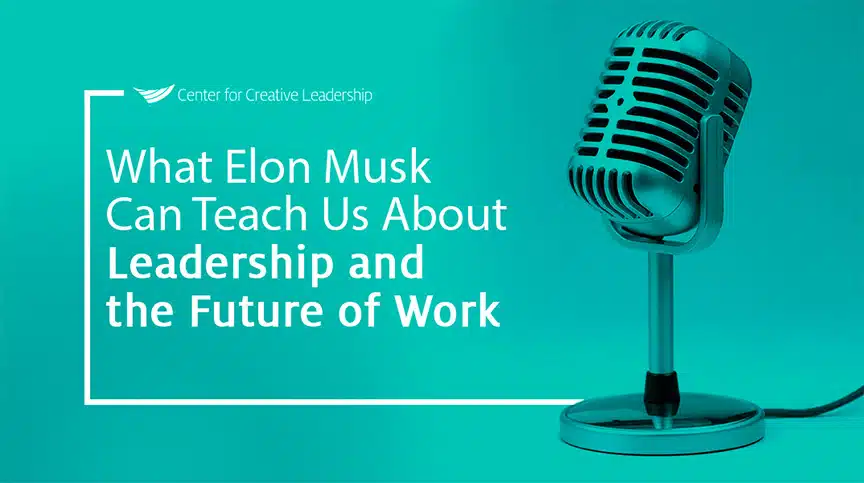- PODCAST
Lead With That: What Elon Musk Can Teach Us About Leadership & the Future of Work

In this episode of Lead With That, Ren and Allison explore what lessons we can glean from the recent headlines involving Elon Musk.
The future of work, the future of automobiles, and the future of free speech: At the nexus point of all of these is Elon Musk. Musk has never shied away from the public eye, but recently, through his attempted purchase of Twitter and his recent comments about remote work, he’s once again caught our attention here at CCL. At the center of his comments stem 2 core issues of concern for leaders in this modern era:
- What does leadership actually look like? Is leadership the role or realm of a single individual? Or can leadership be shared, cultivated, groomed, made to thrive together?
- What does the future of work really look like? Will remote work actually be put on ice by the world’s most powerful leaders?
These are real questions affecting real people, so in this episode we have to dig in. Is Musk’s point of view a taste of things to come? Or, is it that dying breath of a breed’s last thrashings? Join Allison and Ren as they explore what lessons we can glean from the recent headlines involving Elon Musk and lead with that.
Listen now or read the full transcript below.
Listen to the Podcast
In this episode, Ren and Allison explore what lessons we can glean from the recent headlines involving Elon Musk.
Interview Transcript
INTRO:
Welcome back to CCL’s podcast, Lead With That, where we talk current events and pop culture to look at where leadership is happening and what’s happening with leadership.
Ren:
The future of work, the future of automobiles and the future of free speech. At the nexus point of all of these things is Elon Musk. Now, Musk has never shied away from the public but recently through his attempted purchase of Twitter and his recent comments about remote work, he’s once again, caught our attention here at CCL and at the center of his comments stem really 2 core issues of concern for leaders in this modern era. One, what does leadership actually look like? Is leadership the role or realm of a single individual or can leadership be shared, cultivated, groomed, made to thrive together?
And two, what does the future of work really look like? I mean, will remote work actually, be put on ice by the world’s most powerful leaders? These are real questions affecting real people so we had to dig in. Is Musk’s point of view, a taste of things to come or is it that dying breath of a breed’s last thrashings? I’m not sure the world’s richest man would appreciate the comparison and so here we are. Welcome back everyone. I’m Ren Washington and as usual joined by Allison Barr… Allison, I’m wondering would your perspective of Twitter change if Elon Musk was the owner?
Allison:
My perspective of Twitter, would it change? Not immediately, no. Would yours?
Ren:
No. But I wonder then maybe the second question, does it matter what we think of Twitter or rather does it matter if Elon Musk buys Twitter?
Allison:
Does it matter to me, does it matter to whom?
Ren:
Sure. Does it matter to you and could it matter?
Allison:
Well, I suppose we don’t know. He has been semi-transparent about his plans, also not transparent at the same time. I know that today, June 16th, he addressed his staff in an all-staff meeting for Twitter. I will be very curious to see what he does with Twitter’s Work from Home Forever policy as they called it. Literally, the “work from home forever” policy, given some of his recent Tesla policy updates that employees must return to the office or else as I’m air quoting him “or else” you have to resign. And he did say that the company would prioritize working in person under his leadership but that there could be exceptions for air quoting again “excellent contributors” whatever that means. So he’s been sort of infamously vague while being specific about certain things at the same time. So you asked me if it will impact me. No, I don’t work there and I have a Twitter account but I’m not a huge Twitter user. So what about you?
Ren:
Would the whims of the hyper wealthy impact my day to day existence more than they already do? I don’t imagine they will but I can’t help but recognize the irony as you alluded that Elon Musk had his first Twitter all staff today and it was a virtual meeting. And as we know Elon recently said, “Anyone who wishes to do remote work must be in the offices for a minimum and I mean, minimum of 40 hours per week or depart Tesla.” So I just can’t help but wonder what that means for Twitter. And then I love the follow up, someone pinged him on Twitter or something and said, “Hey, what do you think about the 40 hour work week being antiquated?”
And he said, “Well, those people can pretend to work somewhere else.” And so I wonder then when I think about, “Well, does Elon’s ownership of Twitter impact me?” Yeah, likely. Especially, when we talk about the future of work for leaders who have to live and breed in these cultures all of the time. And so maybe I’m most interested in starting there, Allison. What does Elon Musk’s purchase of Twitter… Should it go through, which is an ellipse and a question mark and shrug emoji… But what does his purchase of Twitter mean for the future of work in America?
Allison:
Well, I want to back up for a minute because what is also intriguing is that shortly after that email leaked about Tesla workers or else, 40 hours minimum or else, you can pretend to work somewhere else. I think it was 2 days later, he announced that he needed or wanted to reduce staff at Tesla by 10% for financial reasons. And there are some people who are speculating that he said those things in efforts to encourage resignations and whether or not that’s true I don’t know but that is a speculation as he is known as someone who is quite savvy for better or for worse.
And so whether or not he actually meant it is still up for debate and so if he’s saying that at Twitter, there can be exceptions for people who work from home and there’s going to have to be, let’s be honest because Twitter as it stands today, does have a Work from Home Forever policy, meaning you can work from wherever you want. So what will Twitter do with those thousands of employees who don’t live near an office? So a lot of questions, a lot of question marks. And I don’t know that Elon Musk is going to influence the future of work for everybody. Am I understanding correctly that is what you are implying?
Ren:
Well, I wonder if what happens at Twitter also happens at GM. You keep talking about that Twitter had a policy that they would work from home forever. But maybe not with new leadership. When I think about new leadership, and I think that’s something maybe we can talk about today, this idea of leadership. But if the owner says, “We’ve got new policies,” then yes, back we are thrust into the conversation of change management versus change leadership. How do you really create a culture of follow through when you tell people these are the rules whether they abide by them or not.
But I can’t help but wonder, is the future of work then… A new owner saying, You either work at the office, or I will put policies in place to make you quit, because we’ve got to cut headcount anyway. So yeah, I wonder if there aren’t people who are tapping their chin going, huh? Let’s say, the ploy was to get people to quit. Maybe I too will mandate a return to in-office work or maybe there’s another option where he is looking at it and saying, “I do like the office. I think we can work better. If Twitter can do it, and they’re a company that used to be work from home forever, then maybe I can make my people do it and we never promised work from home forever.”
Allison:
Right. I mean, we’ll see. And with reference to Twitter and I mean, this is Elon Musk that we’re talking about. I’m sure he’s thought this through but what I’m saying is they have thousands of employees who are remote, who are not near an office. What is he going to do? You have to move, he will lose more employees likely, than his suggested and presented potential layoffs of, I think he said less than 500. And again, whether or not that’s true, who knows he could come on board officially and change his mind. He has not committed to anything just yet but he has subtly expressed layoffs, subtly. So who knows? It makes me think of the Goldman Sachs story from a couple of months ago, do you know the Goldman Sachs story where the employees revolted?
Ren:
I feel like I heard it in the beginning days of the thaw where we’re coming back to work but people said, “No, we’re not.” I don’t, tell us about it.
Allison:
Yeah. So this was this year and their CEO demanded everybody’s coming back to work like you just said. It was a demand, this is not a choice: You want a job? Come back to work. This was in their New York City office. And 5,000 employees said no. 5,000. So we’re not talking about 5 people, we’re talking about 5,000. People said, “I’m not coming back to the office, you’re going to have to come and get me, drag me.” I don’t know if they said that, but they did not come back to the office.
And that forced the CEO to somehow, some way, meet them in the middle. So as we talk about leadership, you alluded to this at the beginning, is leadership a singular person, a leader especially, in times of crisis, who’s dictating what needs to happen? What are the impacts of that or is it social where the group decides? So I don’t know, but what I do know is that a recent Harris Poll found that 62% of working Americans said that they would take a lower salary in exchange for work from home options or look for a different job. So, curious, we’ll see.
Ren:
So maybe he’s run the numbers, he’s willing to lose 60% of his workforce.
Allison:
That’s a big chunk.
Ren:
Well, I wonder, does this person understand the scope of their decisions? I mean, if you’re a billionaire, what’s the real cost if you’ve hired someone for $45K and they quit. Rehiring them is not just a new $45K, it’s tantamount to double that, like $100,000 worth of time and effort spent. I wonder if there’s not a shrug emoji to use again, where he’s going to be like, “I don’t know, is it worth it for me?” And I wonder if there’s enough motivated Tesla employees to stand together and band together and say “We 5,000 refuse,” and I can’t help but wonder, and maybe this is the cynic in me…. If the response would be, “I dare you, go ahead.” I wonder what the acceptance rate of applications is at Tesla. I wonder how many thousands of applicants sign up to try to work there and how few get in. So in a true power position where someone might amplify an abundance versus a scarcity mindset, is that used as a lever to tell people, “Suck it up, get back to work.”
Allison:
Well, do you think that’s an effective leadership style?
Ren:
Well, Elon Musk is the richest man in America.
Allison:
The world, isn’t he now?
Ren:
Richest person on earth.
Allison:
Yeah. Period.
Ren:
See, I started small everyone and then I went big. So I can’t help but pause and think, does it matter?
Allison:
Does what matter?
Ren:
I don’t know, any of his decisions but maybe this one that we’re talking now. Couldn’t one rationally say like, “You don’t know, you have it wrong. I’m going to manage this company the way I have because look at what I’ve done. I’m exploring Mars for potential new Earths so who are you to tell me that my Return to Work policy is ineffective?”
Allison:
Yeah. I mean, I don’t mean his policy. I mean his the way you just described dictating and how I hear threatening. Is that effective? So not necessarily the policy but the, “do this or else.” I’m air quoting him again, “pretend to work somewhere else.” I don’t even know what he meant by that … I mean, I do know what he meant by that but Tesla’s doing just fine in terms of finances. And another part of this is, if we think of Tesla specifically, you can’t build cars from home. So again, if I’m just thinking of Tesla here, there are some organizations that cannot holistically work from home, you just can’t. So you can’t build a car in a factory setting, like in my basement, that’s not going to work. So there are some people who do have to go back to their workspace, I get that. However, why try to fix something that’s not broken at Twitter? Why, what’s the point?
Ren:
I mean, it’d be interesting to see how long Twitter’s been remote. If that was a pre-pandemic posture, if their audience or their clients or their employees felt that they didn’t have to do too much transformation in the face of the digital push that COVID caused. What I will say about Tesla is, I think Elon was talking about people who work in the office because I think one of his responses into the minimum of 40 hours was that we ask our factory workers to work more than that. And so while I understand that there are certain industries or businesses that require an individual to be present, I have to be thinking that memo was for people who used to be present but aren’t.
Allison:
Oh, yes.
Ren:
And I can’t help but keep wondering is this just a real estate issue? Is it because I’m paying for square footage and I need to use it? Or is it because leaders like to come into the office and have the big office and be seen? There’s so much interesting psychology around it, there’s so much interesting application. And we’re always doing science on collaboration but I keep on coming back to this and maybe I will, again, what if he says, “See you later. Your option is come into the office or leave Twitter”?
Allison:
Well, if I live in… Well, I do. I live in Colorado and I work for Twitter, there’s no Twitter headquarters here. So are you expecting me to uproot my life and my partner’s life who has kiddos to just work for you? Bye. See you. I would happily part ways. And here’s 2 things within that, I am in a privileged position where I could quit my job and I would be okay for a little while financially. I have a roof over my head and all of that and we’re still in a great resignation, we’re still… It’s a job seeker’s market, so I don’t know.
Ren:
Yeah. It seems sometimes a little tone deaf. I wonder, are you-
Allison:
Me?
Ren:
…No, not you, him. No, you seem right on, his response seems tone deaf. This idea, I’ll threaten you amidst all of this exodus of people looking for value driven work, looking to make decisions for their future and their family as opposed to adjusting time. However, you do highlight something really important, the idea of privilege and then the spectrum of privilege. And I can’t help but think, “Okay. Well, if you work at Twitter, odds are that you were probably, fortunate enough and hardworking enough but fortunate enough to have a lot of opportunities that maybe certain people don’t, certain people may not have access to be in the high competition, high technical environment.”
And then two, to be able to be privileged enough to say, “If I don’t like it, I’m out.” The age old, let me call your bluff by these leaders that I think is weird. It feels depression era, it feels like turn of the century industrial age, oil magnate saying, “It sucks for you, you either deal with it or you’re gone.” And then to this part of me thinks, “Well, is this all just a weird show? Is there anything that’s meant? Will anything happen anyway?” But it just feels like, who’s around this guy saying, “Yeah, man. This is the play boss.”
Allison:
Well, to your point, he is the boss. And so when you, the general you, not you, Ren. But when the general you thinks of Elon Musk, he’s known for innovation, he’s known for being an excellent savvy businessman. He’s known for being exceptionally smart, which he is. I listened to this podcast of him from maybe 4 years ago, talking about AI that was terrifying. Just, he’s beyond intelligent so he does have these good qualities. However, you mentioned this sort of archaic style and being the boss who is threatening and that’s the style and so just a couple of things to think about that get casually overlooked by people and it’s my opinion that because he’s a billionaire, there’s some sort of fascination with that so they let go of these things that I’m about to tell you.
So this is all public record, by the way, you can Google this. This is all public. He went after a whistleblower of Tesla and whistleblowers of course, are protected by the law. He suggested that this whistleblower was going to commit a mass shooting and of course, the investigators showed up at this poor man’s house. This man had no plans to do that but Elon Musk aggressively went after him after he reported that Tesla’s security was unethical. He baselessly, zero claim accused an English diver of being a pedophile publicly. These things ruin people’s lives. He falsely claimed that investors put up funds to take Tesla private at $420 a share. This turned into an SCC investigation, a lawsuit. He’s currently in a public lawsuit over hostile racism which actually, that’s been resolved and the company lost that.
He illegally threatened workers with loss of stock options if they unionized, that’s not legal. He’s publicly made sexist jokes on his Twitter page which I will not repeat because they’re inappropriate. In 2018, the US department of justice investigated whether Tesla misled investors and misstated production figures. He’s publicly compared Justin Trudeau to Hitler then trivialized the Holocaust. Tesla and SpaceX currently are being investigated by 3 different government agencies. I could go on here, animal cruelty.
Ren:
It sounds like that.
Allison:
Car recalls, animal cruelty, discrimination, I could go on and on. And people don’t pay attention to this generally speaking because he’s in this magnificent, just unimaginable position of power given his wealth. So I say all of that just to give the full picture, when we think about leadership style, here’s what he’s known for but here’s what the actuals say and that’s interesting.
Ren:
And then I go back to my question, if we’re going to explore style and two, the big principle of who’s around this guy saying, that’s the play, this idea of social leadership or individual leadership. At CCL, we believe leadership is a social process and that you don’t have to have a title to be a leader. And just because you have a title doesn’t make you a leader. And I think I could argue here that Elon Musk is clearly and unequivocally a leader and likely in certain pockets of the world, some would say one of the most successful leaders the world has ever seen.
Allison:
How do you measure success of a leader, you?
Ren:
I would point to me… Well, you see, now that’s not fair.
Allison:
Yes it is.
Ren:
I’m not one of those people who would say that he’s the most successful leader in history though one of my aspects of success would be achievement of one’s goals and for a business in a capitalist society, I might say that one’s revenue and one’s accumulation of wealth and resources is a sign of success. So even, I could admit that there’s parts of Elon Musk that are hard to deny are working for him.
Allison:
So achievement of goals, regardless of the how?
Ren:
Well, I didn’t say that part.
Allison:
No, I’m clarifying. I’m asking you to clarify that because literally, I could go on with that list.
Ren:
I don’t know, do-
Allison:
And after I read you that list of him harming people very aggressively and life changing harm to people, you responded by saying you see him as a successful leader and I didn’t even get to the whole list by the way. And so I’m just asking you to clarify.
Ren:
… okay. Well, I’m glad that you’re giving me a chance, everyone. Don’t at me because you’ll never find me. But what I meant was not because of those things is he successful. I was suggesting that one might consider him to be successful but I’ve raised one for you. Let’s say the electronic car evolution, let’s say that started because of Tesla. Let’s say we go to a carbon neutral automobile fleet across the globe and it could be directly traced back to the infrastructure that Tesla created then one might explore, “Well, geez. Do some of those ends justify the means?”
Allison:
Well, we haven’t done that so –
Ren:
Yes, okay. So you’ve caught me in the hypothetical that we’re not yet there.
Allison:
Yeah. Well, I mean, those 2 things can exist separate, you know what I mean? We’re not there so it’s not worth the conversation in my opinion. Why are we talking about that when I can talk about right now about what he’s doing? Is he innovative? Yes, he absolutely is. Is he beyond brilliant? Absolutely. Has he done some fascinating things in the business world? Sure, absolutely. But this is a man who it’s been reported that in terms of tech companies, his pays the lowest.
Allison:
It’s been reported that one of his factories had 450 public health violations and he refused to close it. He refused to close it because he had to pay a fine. And to your earlier point, if he didn’t close it he would pay a fine which to me and you would be a hefty fine but to him, it’s not. And so he’s putting a whole lot of workers at risk, 450 violations so that he can achieve his quote unquote, “goal.” One of those goals as I understand, it was to get in a spaceship and go to another planet. So that to me, we can acknowledge his brilliance and also acknowledge that he is harming people.
Ren:
And you even add, you’re talking about innovative, brilliant. We pointed that list that you talked about, you pointed at these things right now. It sounds so archaic that you’d expect someone who’s so diligently pushing for the reaches of space to not treat his people like they’re Depression-era kids in the coal mine. It just seems like such an interesting cognitive dissonance. And so I guess, what an interesting answer, Allison, that you raised that we could get caught up in hypotheticals or the potential of electric vehicles or that than societal impact.
But I think what we really need to talk about and I think you highlighted it too, is the idea of the pyrrhic victory. We’ve maybe talked about that or that idea of the ancient general who won but at the extent of losing his whole army. And so ever since it’s been called a pyrrhic victory where we won but at what cost. And so I mean, maybe Tesla is a harbinger of the future. And from what we can tell, the operations, the insides, maybe this new lens on future of work and maybe the standard, “I am the commander; do as I say,” is not in vogue, it is passé. It is of old times and likely not what the future holds…unless it is.
Allison:
Right. We’ll find out, I suppose. But there’s a lot of research out there from CCL, Deloitte, Harvard, a lot of research that states that COVID only jump-started the future of work. That experts already knew it was coming, and so there’s part of me that when I think of Elon Musk, he has to know… It doesn’t add up to me right in terms of how much he has the pulse on the future in other ways. It doesn’t add up to me that he’s not embracing the hybrid workplace or work from home or flexible work arrangements. So it’s curious, I just wonder if there’s something else behind it. I don’t know.
Ren:
There must be. It is I guess, isn’t that just the nature of things where all of us stare at these singular, incredibly wealthy figures and be like, “I wonder what’s happening inside that there noggin.” But I can’t help but think again, this idea of leadership and for whatever reason, it seems, at least behaviorally for me, that he is the one who’s calling the shots. And maybe if there were more people or he was invested in more information sharing then these things wouldn’t seem so tone deaf or so off-base. I think one of the things we talk about at CCL all the time especially, around our idea of what it means to be an effective leader, is how can you be one that facilitates conversation that enables an environment for emergent and shared leadership.
This idea that Allison, you and I and someone else could be working on a team as our team: Allyson, Emily, Allison, me. And in our instances, we need to work together to have leadership come to its fullest extent to come to be realized. And I don’t know if Elon Musk has a cabinet of adversaries or whatever, this idea of people who disagree with him. It almost seems like either he is the only one calling the shots or there are no people invested in the social process of leadership with him.
Allison:
Well, so two things, if you Google and I’d encourage you to do this… If you go to a Google search and you search, does Elon Musk… And then you know how there’s a bar that comes up underneath that with suggestions to finish that Google search, one of those Google searches will say, does Elon Musk fire someone every day? And so naturally, I had to click on that, because if that’s one of the top searches, there must be something behind that. So I read some articles and these are all former employees who report that part of his style is that you should fire someone every day. Whether or not he does or not that is his brand, that is part of his MO. And again, Elon Musk never said this that I could find but his former employees have said it.
And then another thing that I think about is, Elon Musk aside, when I think of a CEO, most CEOs still have to appease shareholders. And so part of Elon Musk’s job is to maximize shareholder wealth, that’s part of his job. And so is it part of his strategy right now? I don’t know. To your point, we’re just sitting behind a screen, talking about him but is part of his strategy right now, in some ways going to maximize shareholder wealth?
I don’t know but probably, because he’s a CEO that’s part of his job when he reports to a board. And then the one other thing I have to say about what you just said is that Elon Musk doesn’t have to answer to anybody. I mean, if you need money to survive which you do, you need money to survive. Elon Musk could quit his job tomorrow and he could feed generations of the Musk family. His generations of his family would never have to work if that’s the route he wanted to go. So why should he, I mean, ethically, he should think about his actions but he doesn’t have to report to anybody.
Ren:
Yeah. I was just doing series of kickoffs today with our programs. And I remind people that come to CCL that CCL is not a “fix-it” organization. People don’t come here when they’re broken, they come here when they’re kicking butt and then they’re ready to kick more butt. And so I think, what I’ve tried to pitch to these leaders is, “Look what all you’ve accomplished, standing alone out there, almost trying to make enemies. Imagine if you just made a few less enemies or even a few more friends.” And I think the data supports it and we talk about it at the center. And if there’s any big takeaway for me here around all of this, whether it’s the future of work or this idea of leadership and social or individual leadership is that, as a leader I really believe your job is to be an amplifier.
Your job is to augment positively, the people around you, your job is to create an environment for people to thrive so that we all can be better together. Now, it’d be hard to tell the richest man in the world, “Hey, maybe do something different.” But actually, that’s what we tell people all the time at CCL. I don’t tell people to disregard all they’ve done to get here. That would be irresponsible, but instead we think about what’s going to get you there. Now, for Elon I guess, there is Mars. I mean, what carrot do you wag in front of a multi-billionaire, other than potentially the future of not just the Musk family, but so many more families. And so leaders, we know that you’re better with leadership that makes other people thrive. That type of leadership is often demonstrated as more effective, more efficient, and easier to work with and frankly, easier to be around. And so I would say that these pockets of individual leadership or exceptions that prove the rule, however multi-billion dollar exceptions. So I guess, there’s hope for us.
Allison:
Yeah. I mean, I think what’s interesting too and when we think about recovering from the COVID-19 crisis, some of the economic downfalls that came from that. So the impacts of the Russian-Ukraine war, there’s a lot happening. And so embracing technology and blending it with a very human-centered approach is what we at CCL recommend as well as a lot of other researchers out there. So Deloitte also did a study on this too but CCL found that focusing on your people’s the most important part of adjusting to new ways of working. And we’ve talked about this before, things like mental health and physical well-being, rethinking what productivity means, what does it actually, mean to be productive. Limiting things like back-to-back meetings, these things seem somewhat obvious to me. However, what I really liked that I found was this suggestion for managers to act more with ownership.
And so what that means would be allowing managers to be in more of a driver’s seat, allowing managers to create a team vision or team charter with new habits or ways of working and doing that with the team versus telling them so that they can be their own mechanism to reinforce those behaviors and new ways of work. And the way to success for future of work is, in fact, definitely more human, definitely more collaborative than it ever has been, because it’s going to take a while to adjust. Things are not going back to normal, so it’s going to take some time to adjust.
Ren:
And it’s going to take people like you, listeners and leaders out there, to be the tip of the spear, the vanguard for those adjustments and helping us find that social solution.
Allison:
Yeah. So I suppose we can leave it at that.
Ren:
Probably, I mean, we could keep going, but you’re probably right.
Allison:
…I know I could keep going for an hour on this topic but as we say at the center, leadership is a social process and the way to success of future work is in fact going to be more human, more collaborative, more social than it ever has been. So thanks for the conversation, Ren. And for our listeners, you can always find our show notes and our podcasts on ccl.org. And you can find us on most social platforms, unless you are Ren Washington, he will not be found apparently, but you could try.
Ren:
Can’t find me. Well, LinkedIn, I guess.
Allison:
So connect with us, let us know what you want to hear more about and we’ll look forward to tuning in next time. Thanks, everyone.
Ren:
Thanks a bunch, everyone. See you next time.
| What to Explore Next
| Related Solutions
Sign Up for Newsletters
Don’t miss a single insight! Get our latest cutting-edge, research-based leadership content sent directly to your inbox.






